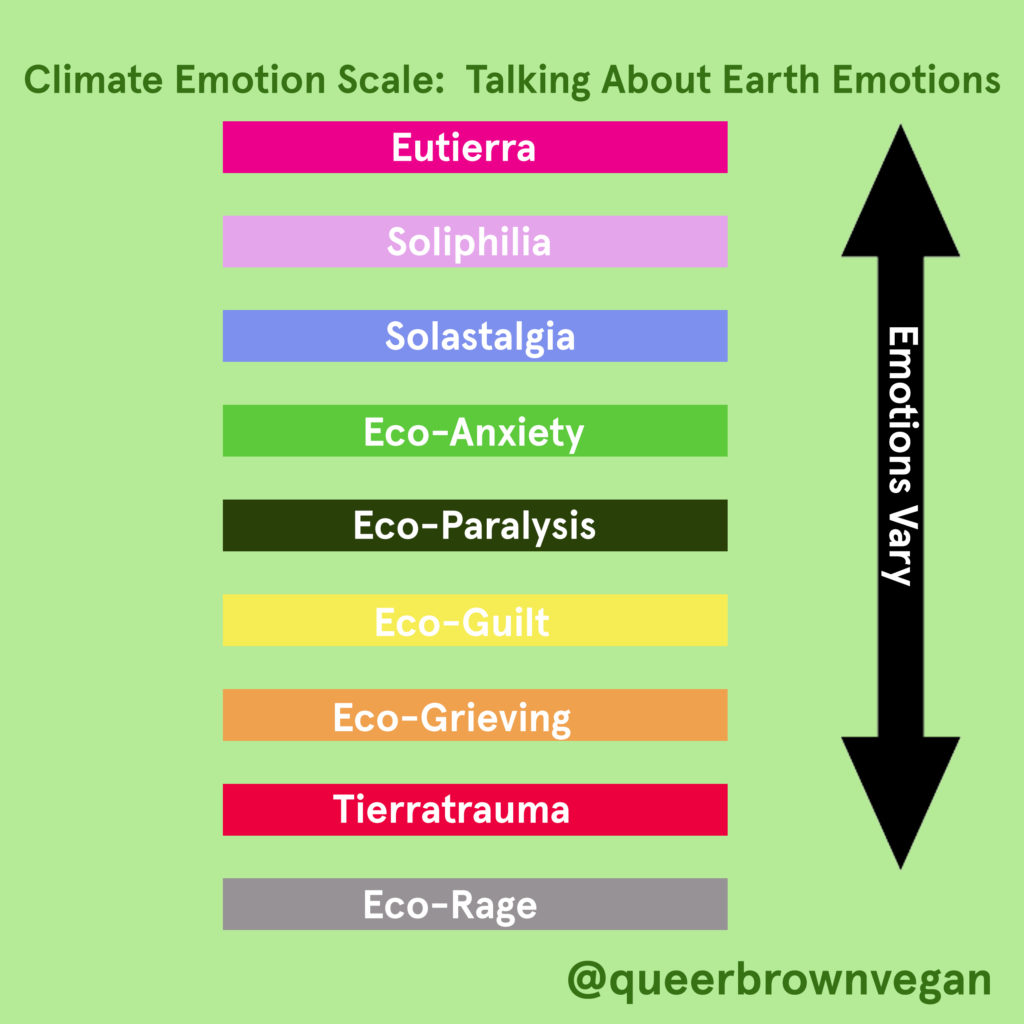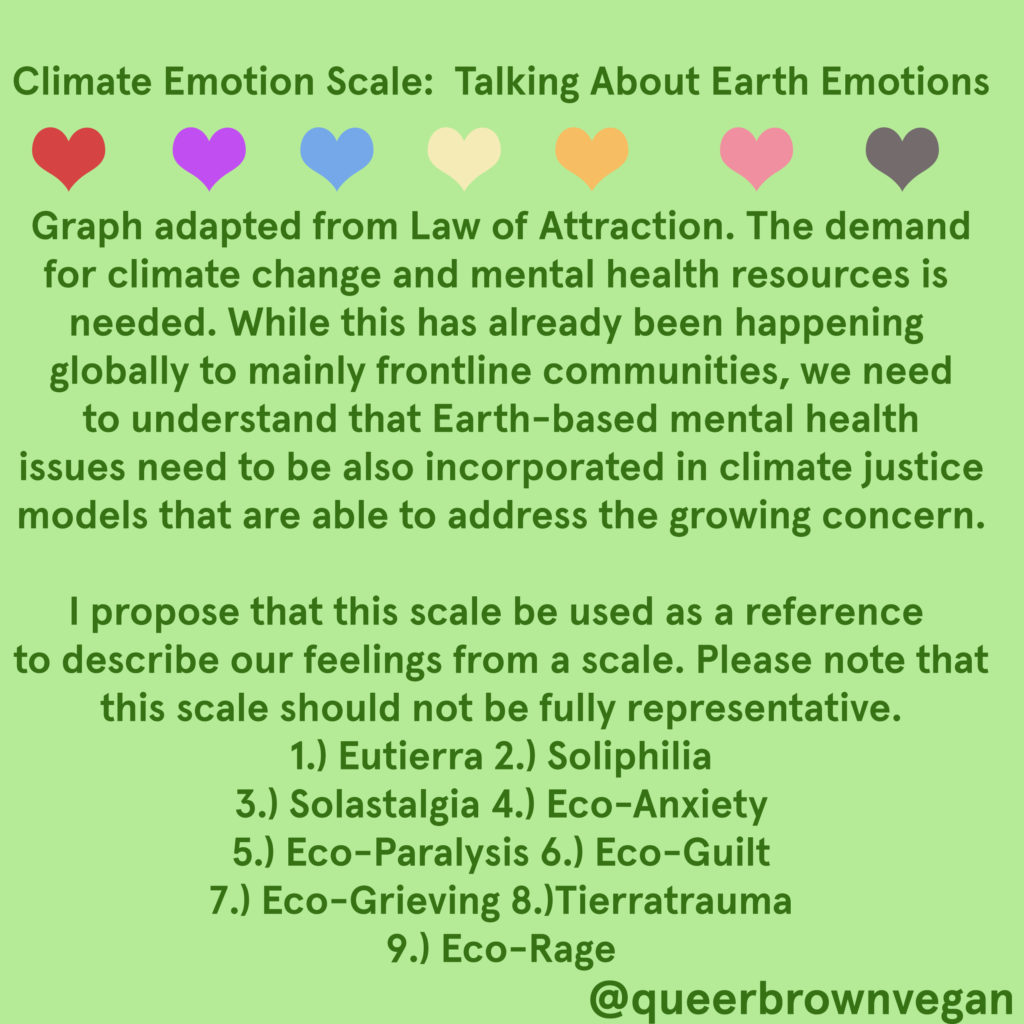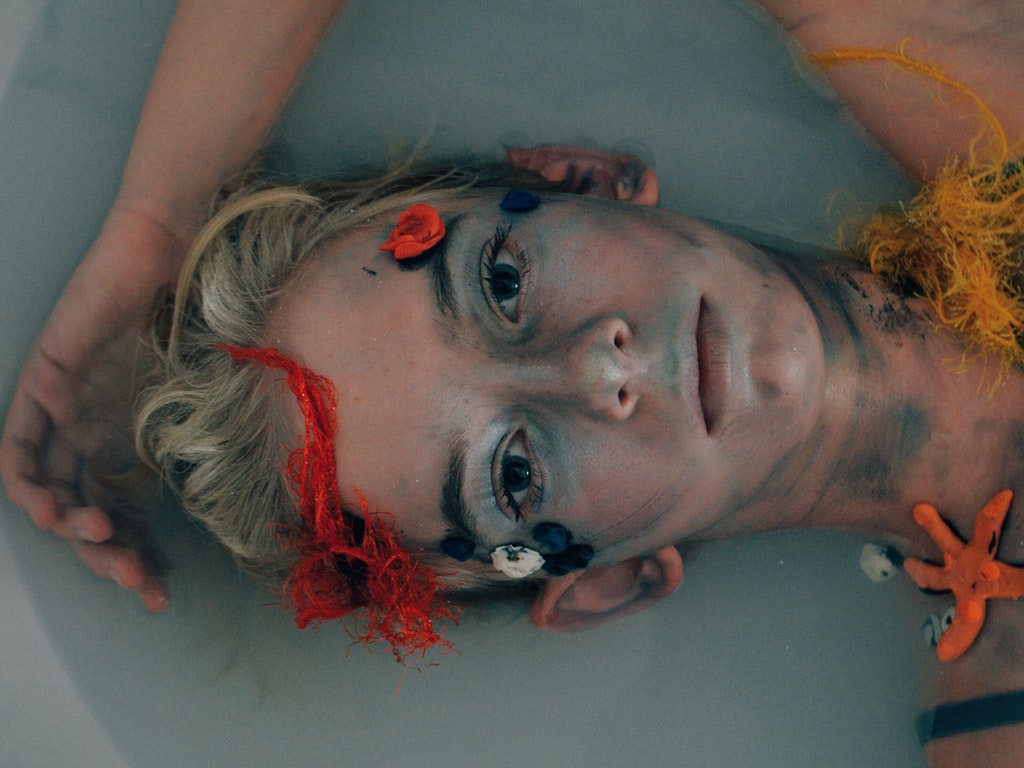6 Mins Read
Research by the American Psychiatric Association shows that more frequent natural disasters caused by climate change are contributing to a skyrocketing levels of anxiety and trauma. Isaias Hernandez is the founder and activist behind Queer Brown Vegan, a platform he created to offer accessible environmental education about topics such as environmental justice, veganism and zero-waste living. His work has resonated with hundreds of thousands of people who are looking from more than the average influencer gram from their eco activists. He write a great deal about the impact of his activism on his mental health. More often than not, he was unable to find the right words to express the range of emotions and feelings his work brought up, so he developed the Climate Scale, a framework that individuals and researchers can use when communicating about climate change and associated mental health topics.
He is quick to point out that the terms of the scale were not coined by him (many were first used by Australian sustainability professor Glenn Albrecht), instead, he built upon them to develop a range that allows people to best identify and describe them at the moment. “Situating emotions and feelings can provide a sense of clarity and intention when talking about these types of mental-health related issues,” Hernandez explains. “Emotions and feelings are interconnected and emotions represent bodily actions, feelings are the conscious experience of emotional reactions.”
Hernandez is vocal about issues like climate injustice and highlights that “globally speaking, Black, Indigenous, and People of Color (BIPOC) from low-income communities are the ones that are facing the highest rates of climate change mental health related issues”. Unfortunately, “climate change mental health resources are not available for many [of these] communities,” he adds.
There are nine states of feeling in Queer Brown Vegan’s Climate Emotions Scale Framework, which include Eutierra, Soliphilia, Solastalgia, Eco-Anxiety, Eco-Paralysis, Eco-Guilt, Eco-Grieving, Tierratrauma and Eco-Rage, and below, we delve deeper into each.

Eutierra: The Interconnectedness Of Whole
The term ‘Eutierra’ was coined by Glenn Albrecht, whose life work involves looking into the feeling of being interconnected to Earth and finding peace. Those who experience Eutierria may have a positive feeling when it happens and are able to understand the interconnectedness of environments and self. “We experience the state of Eutierria when we are feeling the oneness of the Earth,” according to Albrecht. He expressed that when one is in a mental space whereby the “boundaries between self and the rest of nature are obliterated, a deep sense of peace and connectedness pervades consciousness.”
Soliphilia: The Love For Place
Another Albrecht term meaning “Love of the interrelated whole,” Soliphilia looks into the love and appreciation for a location, bioregion, and the planet as a whole that is deeply rooted in interconnectedness. Many people have deep embedded relationships with their home environments that allows them to cultivate, regenerate, and construct healing practices that are circular in unison.
Solastalgia: The Sorrow For Place
Solastalgia is a concept that describes giving emphasis and meaning to environmentally induced stress (Albercht et al. 2007), evoking the anxiety and sorrow a person feels when their natural environment is impacted, especially when they directly relate to their home environment. When natural home environments are altered, it affects the person on both a physical level and a psychological level. Interestingly, “societies whose livelihoods are not closely tied to their environment are not as likely to express solastalgia and, in turn, societies that are closely tied to their environments are more susceptible.”
Eco-Anxiety: The Anxiety For Earth
Eco-Anxiety is the anxiety of the future of the natural environment. This type of anxiety can manifest as worry for the future of ecological disasters that are set to happen as the climate crisis continues to worsen. Rising carbon emissions, melting of glaciers, land deforestation, oceans collapsing, and increasing global temperature- all lead to our increased anxiety level. There are now eco-psychologists that encourage individuals to adopt environmental based values in their own lifestyles in order to help handle feelings of eco-anxiety.
READ: Green With Worry: Do You Have Eco-Anxiety? A Beginner’s Guide
Eco-Paralysis: The Detachment Of Response & Action
Glenn Albrecht coined the term Eco-paralysis to describe our inability to respond to the climate crisis that society is currently facing. Albrecht further noted that “people appear apathetic and disengaged with reality as it unfolds, but their detachment might be eco-paralysis rather than apathy or avoidance” (Albrecht 2011).

Eco-Guilt: The Regret Of Knowing You Can / Could Have Done More
Eco-Guilt is a state whereby one feels they could have contributed more to help the Earth. This type of guilt is rooted in the fact that many people are privileged enough to have been able to live a life that hasn’t necessarily been impacted by climate change. The term also highlights how the individual focuses on blaming themselves, rather than assigning responsibility to external systems that are in play.
Eco-Grieving: The Tears For Earth
Eco-Grieving or Ecological-Grieving is a term first used in a Nature Climate Change article and is “associated with the physical disappearance, degradation, and / or death of species, ecosystems, and landscapes” (Cunsolo, Ellis 2018). This type of grief is notably noted by researchers as disenfranchised grief, or grief that is not publicly known or talked about. People are noted to process eco-anxiety through stages of grief. During this time, people are encouraged to form networks of support throughout this stage. It’s also worth underling that Eco-Grieving is not a linear state.
Tierratrauma: The Pain Of The Earth
Tierratrauma is a term that explains the sudden grief or pain a person experiences when witnessing a traumatic environmental change. Glenn Albrecht explains that when you experience Tierratrauma, “it’s like an acute Earth-based existential trauma in the here and right now”. This can be seen in a variety of events such as land destruction, forest fires, floods, tornadoes, demolition of your streetscape, oil spills, people in their environment being severely hurt and displaced- many of us will have experienced this more and more in recent years as extreme weather events due to climate change become increasingly frequent.
Eco-Rage: The Anger Towards Colonial Systems
This anger is stemmed towards the system and people in power that continue allow to the degradation of the Earth. For many global BIPOC communities especially, colonialism has had huge impacts on their ecosystems and in many case, has prevented them from being able to practice their ancient regenerative practices.
Hernandez hopes his Climate Scale will provide comfort for those experiencing previously unnamed feelings and the global community will use it as a basis for growth and awareness building. “As natural disasters are increasing over the next few years, it’s important for people to associate their feelings and emotions with words. The Climate Scale framework is for people to use and build upon.”
This piece is an adaption of Queer Brown Vegan’s ‘What is the Climate Scale?’ piece (read it here). All original concepts by Isaias Hernandez with editing for clarity and length by Green Queen Media Editor-in-Chief Sonalie Figueiras.
Lead image courtesy of Pexels, all other images courtesy of Isaias Hernandez/Queer Brown Vegan.




